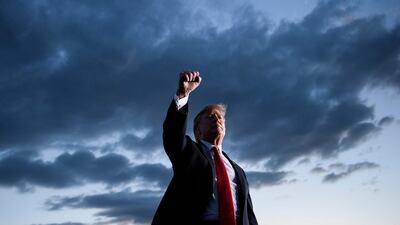Comparisons of present-day politics with those of the 1930s have become commonplace. Since 2016, the year of Britain's vote to leave the EU and Donald Trump's presidential victory in the US, warnings about the death of democracy and the rise of authoritarians, from the Philippines to Brazil, have abounded.
With this year marking the centenary of the establishment of the Weimar Republic in Germany, a state too weak to withstand the pressures of economic collapse and angry nationalism, which led to the rise to power of Adolf Hitler in 1933, we will hear still more.
Parallels can certainly be found. Weimar is a byword for decadence and the breaking down of old standards of behaviour and morality, which proved a liberation for some, but caused confusion and revulsion in others. Sound familiar?
Just last weekend, Germany’s government commissioner on antisemitism warned the nation’s Jews that if they now wear the yarmulke in public, their safety cannot be guaranteed – a terrible historical echo in a country that has worked assiduously to ensure that mistakes of its past are never repeated.
In other countries, ethnic and religious minorities fear increased discrimination, from Muslims in India facing the chauvinism of the Hindu-nationalist BJP government, recently re-elected with a crushing majority, to the Rohingya, who have suffered crimes against humanity in Myanmar.
Across the western world, the far-right has been emboldened. In Europe, ultranationalists have entered governments, from Italy and Austria to Estonia, and have secured further advances in the elections for the European Parliament. The two main moderate blocs, the Socialists & Democrats and the Centre Right, lost their overall majority for the first time, while, in France, President Macron’s En Marche was beaten by Marine Le Pen’s National Rally.
Doomsayers see great similarities with the decade that saw fascism triumph, the old order crumble and the outbreak of the Second World War. "Parallels are readily drawn between Mitch McConnell and Paul von Hindenburg," writes the historian Adam Tooze in the New York Review of Books. "There is talk of a Reichstag fire moment, in which an act of terrorism might be exploited to declare emergency rule."
This is the point at which I say: “Hold on. This is way over the top.” Von Hindenburg was the German president who laid the ground for Hitler to take power, making him chancellor in the misguided belief that he could be controlled by his mainstream conservative partners in government. Mr McConnell may, as Republican leader of the US Senate, be an enabler of the most erratic and divisive US president in living memory. But Mr Trump is not Hitler. Nor does anyone seriously believe he would manufacture a national security crisis to seize power as a dictator.
Neither is the China of today the Japan of the 1930s and 1940s. President Xi Jinping’s Belt and Road Initiative may well be an attempt to gain greater influence over an array of nations near and far; but they sign up to this plan of their own volition. It is not remotely comparable to the Greater East Asia Co-Prosperity Sphere, under which euphemistic name the Japanese Empire expanded its brutal domination during the war years.
Vladimir Putin is likewise no Josef Stalin. Russia’s president may promote nostalgia for the martial victories of the Soviet Era, and he has got away with illegally occupying Crimea. But he is not responsible, as Stalin was, for the deaths of millions, or for crushing Eastern Europe under the yoke of totalitarian rule for decades.
Finally, none of the contenders to succeed Theresa May as Britain’s Conservative prime minister are the equivalent of the appeasers Neville Chamberlain and Lord Halifax, or of Winston Churchill – however much some may fancy themselves as heir to the latter.
The problems with making overdone analogies to the 1930s are many.
Comparing US Republicans to Nazis or Nazi enablers is not just inaccurate, it is offensive to the memory of those who did suffer under Hitler, by trivialising what they went through.
The comparisons can also elevate the danger populist figures represent today – none has dispensed with democracy to rule by military junta, for instance – as well as providing false and perilous imperatives and a misplaced sense that a cataclysm is inevitable.
If China were the new Japan of the 1930s, for instance, then the rest of the world would be obliged to resist its rise, contain it, and treat it as an enemy. This is the trap that too many are already falling into, such as the former top US diplomat Brett McGurk, who wrote recently: “It is not possible to stop China’s emergence in the Middle East altogether. But the US can still shape its position and role.”
This presupposes that the reader agrees that China is a malign power that should have no role in the region, an attitude I find both astonishing, presumptuous and worrying – but one that will only be encouraged by an over-developed belief that history always repeats itself. There is no necessity for it to do so, especially when we know the past so well.
We would be wise to draw lessons from history, and, of course, we should be worried about trends such as the rise of the far right. But talking about a former reality TV star who got lucky, in the same breath as a malevolent Austrian corporal who turned into a genocidal dictator, is not just unhelpful and grotesque. It fuels the polarisation that has caused many of the developments that disconcert us, from populism to nationalism. We need no more of that.
By all means, examine the present through the prism of the past. But to mistake it for a template that predicts, or, worse still, maps out, the future is to risk being locked in a prison of our own making.
Sholto Byrnes is a Kuala Lumpur-based commentator and consultant and a corresponding fellow of the Erasmus Forum


